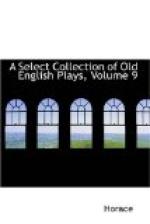[89] [See Halliwell’s “Dictionary,” i. 115.]
[90] [He refers to Amoretto himself.]
[91] [Halliwell, in his “Dictionary,” v. rheum (s.), defines it to mean spleen, caprice. He does not cite it as a verb. I suppose the sense here to be ruminating.]
[92] Old copy, ravished.
[93] [A play on personage and parsonage, which were formerly interchangeable terms, as both had originally one signification.]
[94] [Queen Elizabeth was born September 7, 1533; not her birthday, therefore, but her accession (17th November 1558), at the death of her sister Mary, is referred to by Immerito and Sir Raderic. Elizabeth died March 24, 1602-3. Inasmuch as there is this special reference in “The Return from Parnassus” to the Queen’s day, and not to King James’s day, we have a certain evidence that the play was written by or before the end of 1602-3. See also what may be drawn from the reference to the siege of Ostend, 1601-4, at the close of act iii. sc. 3 post —additional evidence for 1602.—Ebsworth.]
[95] [Old copy, I tooke of, which seems nonsense.]
[96] [So old copy. Hawkins altered the word unnecessarily to thatched.]
[97] [Bespeaketh. Old copies, rellish.]
[98] Old copy, bites a lip.
[99] [So in old copy, but should we not read London?—Ebsworth.]
[100] [There are three references to Ostend in this play. The town bore a siege from 1601 to 1604, when it surrendered by capitulation. The besieged lost 50,000 men, and the Spaniards still more. The expression, “He is as glad as if he had taken Ostend,” surely proves that this play was written after the beginning of 1601 and the commencement of the siege. It does not prove it to have been written after 1604, but, I think, strongly indicates the contrary.—Ebsworth. Is it not possible that the passage was introduced into the play when printed, and was not in the original MS.?]
[101] [So the old copies. Hawkins altered it to delicacies.]
[102] [Poor must be pronounced as a dissyllable.]
[103] [From marry to terms is omitted in one of the Oxford copies and in Dr Ingleby’s.]
[104] [Old copy, puppet.]
[105] [One of the copies at Oxford, and Dr Ingleby’s, read nimphs. Two others misprint mips.]
[106] [Old copy, wail.]
[107] Old copy, and.
[108] [Both the Oxford copies read teate.]
[109] [Both the Oxford copies have beare.]
[110] [Some of the copies, break.]
[111] To moot is to plead a mock cause; to state a point of law by way of exercise, a common practice in the inns of court.
[112] Old copy, facility.
[113] [Old copy, high.]




